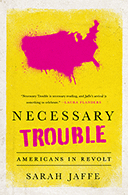“The time for this issue has come.” Keith Ellison on Medicare for All and more.
On March 9 and 10, the Congressional Progressive Caucus gathered for its strategy summit in Baltimore, MD. Members of the caucus and allies from left-leaning organizations and European left parties gathered to talk policy and power for the short, medium and long term. At the conference, I spoke with Rep. Keith Ellison of Minnesota about the new push for Medicare for All, how to talk about racism and economic justice, and why it might be time to think about a maximum wage.
Most of us talk about racism from a very capitalistic standpoint. And what I mean by that is racism is what working class white people do to working class black people.
What if you looked at racism another way? Racism is what the big bosses use to manipulate everybody against each other. That’s another way of looking at it. Same kind of thing. But what does it profit a working-class white person in the antebellum South to be for slavery? That’s keeping you in poverty. But you say, you’re white. We’ll let you walk around in poverty, they’ve got to stay here. It’s the classic pitting of the have-nots against the have-very-littles. And this is the way they do it.
My view is that we’ve got to engage in real conversations with each other. We’ve got to ask who benefits from all this racism. Who loses–all of us! Because Florida purged black voters in the year 2000, the whole country got George W. Bush, which led us into a war with absolutely no justification and the whole country got a prescription drug benefit that enriched big pharma, this happened to everyone of every color. Racism helps elites control everybody else. Therefore our fight has to be solidarity.
Up at Truthout
Up at The Progressive
Up at In These Times
Interviews for Resistance is a syndicated series of interviews with organizers, agitators and troublemakers, available twice weekly as text and podcast. You can now subscribe on iTunes! Previous interviews here.

